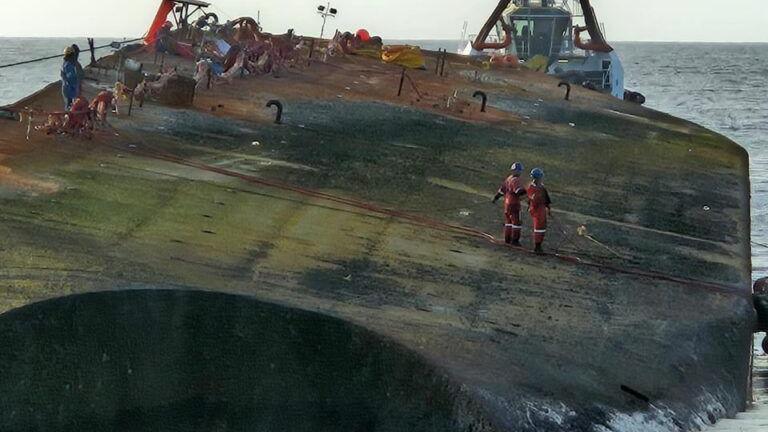Trinidad and Tobago refloats mystery oil spill tanker

Trinidad and Tobago's personnel work to secure the refloated Gulfstream oil tanker
- Published
The mysterious tanker that caused a major oil spill after capsizing off Trinidad and Tobago in February has been successfully refloated, the government said.
The operation was completed on Monday, and the vessel - known only as the Gulfstream - will now be inspected by divers before being towed away, the energy ministry said.
The ship was found with no crew onboard after running aground and overturning off south-western Tobago. No emergency calls were made and local authorities have been unable to find anyone responsible for the incident.
Since then some 50,000 barrels of oil have leaked, damaging the Caribbean island's pristine beaches and prompting the government to declare a national emergency.
- Published27 February
, the energy ministry said the Gulfstream was now afloat in an overturned state 60m (197ft) deep in the sea, secured and supported by tugs.
A team of divers will assess the tanker and remove any hanging debris that could impact its towing to the capital Port-of-Spain in Trinidad.
The government has so far been unable to find who was responsible for the incident, which happened on the eve of the country's carnival celebrations.
Soon after the spillage occurred, the authorities suggested the tanker had originated in Panama and had been towed by a tugboat. They said it appeared "to have been bound for Guyana".
The tugboat was never located.
During a clean-up operation, some 1,000 volunteers worked alongside government staff on Tobago's beaches.
In May, Energy Minister Stuart Young estimated that the overall damage could reach $30m (ÂŁ23m).
In the first few weeks the oil spill spread hundreds of miles, reaching as far as the island of Bonaire, a Dutch municipality, in the Caribbean.